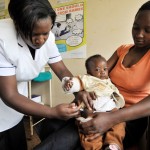
To meet demand from developing countries, the GAVI Alliance will take its first steps towards the introduction of human papillomavirus (HPV) and rubella vaccines in developing countries.
If negotiations to secure a sustainable price from manufacturers are successful and countries can demonstrate their ability to deliver the vaccines, up to two million women and girls in nine countries could be protected from HPV and cervical cancer by 2015.
Responding to projected demand from 30 countries and World Health Organization (WHO) recommendations, the GAVI Board also agreed to open a funding window for vaccines against the rubella virus, which threatens pregnancies and child health. The plan is to reach 588 million children by 2015.
“These two initiatives have huge potential impact for women and families in the developing world,” said Seth Berkley MD, CEO of GAVI, which supports seven other vaccines.
“The HPV vaccine is critical to women and girls in poorer countries because they usually do not have access to screening to prevent cervical cancer and treatment taken for granted in richer nations. Today, we have taken deliberate first steps to correct this inequity,” he added.
The GAVI Board also said it will consider funding a vaccine against Japanese encephalitis once an appropriate vaccine is pre-qualified by WHO. The Board also said it looked forward to the development of an appropriate conjugate vaccine against typhoid.
“The decisions taken today will contribute to GAVI’s mission to save millions of lives and protect people’s health,” said Dagfinn Høybråten, Chair of the GAVI Alliance Board. “We are helping countries accelerate access to life-saving vaccines and increasing the number of innovative ways to ensure the world’s children have equal access to immunisation.
Highly transmissible, HPV causes approximately 275,000 cervical cancer deaths each year, of which 88% occur in developing countries. Experts say this figure could increase to 430,000 by 2030 if action is not taken. Safe and effective HPV vaccines may prevent 70% of cervical cancer cases. HPV also causes other more rare cancers in both men and women.
UN Secretary-General Ban Ki-moon encouraged GAVI, other global health partners and the pharmaceutical industry to “deliver the promise of a future free from the threat of cervical cancer to millions of young women thanks to the HPV vaccine.”
“Investing in their health and their future is the best investment we can make,” Mr Ban added, a year after he launched his Every Women Every Child strategy which GAVI pledged to support with vaccines including HPV and rubella.
GAVI-funded rubella vaccines will be combined for easy delivery with measles vaccines in a single measles-rubella (MR) shot, supporting the global measles immunisation effort. If contracted by pregnant women, rubella can lead to multiple severe birth defects that cause lifelong disabilities. Some 90,000 birth defects occur each year in GAVI-eligible countries, equivalent to 80% of the global burden. It can also lead to miscarriage and stillbirth.
New WHO data released at the Board confirmed that, since its creation in 2000, GAVI has helped immunise 325 million children and has supported countries to prevent more than 5.5 million premature deaths.
Since GAVI began introducing support for pneumococcal vaccines in December 2010, more than three million children have been immunised. Another 10 million are expected to receive the vaccine in 2012 helping protect them against the leading cause of pneumonia. By the end of 2012, an estimated 4.8 million additional children will have received the rotavirus vaccine, protecting them from rotavirus diarrhoea, another leading cause of vaccine-preventable child mortality.
Source: GAVI

















